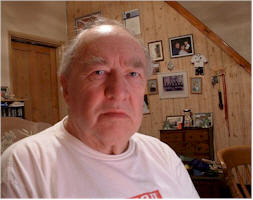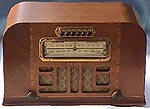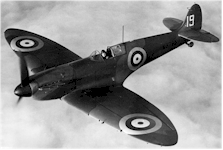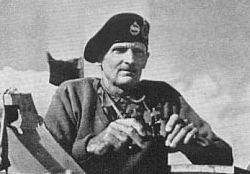
|
|
| Peter Eyre
recalls Evacuation and Education. Darley Abbey: 1940-45 |
|||||||||
|
I was born in 1930 in Derby and lived in Crompton St., just above The Hippodrome in Green Lane. I went to Gerard St. Infant and then Junior School before going to Derby Central School at the beginning of September 1940. My tenth birthday was in February 1940, and the war (I won't bother to keep calling it WWII) had been on for a year. |
 |
||||||||
|
When the war started the previous year all entertainments, cinemas, theatres, and schools (hurrah!) were closed for a few weeks. Hundreds of kids were evacuated into the countryside, though I stayed at home. I was an only child and my father was an inspector at Rolls-Royce, working all hours that God sent, plus Air Raid warden duties, and we saw little of him. With the Grand Theatre closed, my mum, who was a theatrical landlady, suddenly found herself with a dozen soldiers billeted with us. Consequently she had very little time to see what I was up too! How I managed to pass the "scholarship" (as it was then called!) for Central school is still a mystery to me. I still remember the first day at Central School even though it is over sixty years ago. The school had been evacuated to the mansion on Darley Park sometime at the beginning of the war and by the time I arrived had really settled in. The summer of 1940 was hot and glorious, but the war was going badly. The Germans had kicked us out of France, at Dunkirk, and the French had given up without much of a struggle. We had dumped the pacifist prime minister, Neville Chamberlain, and Winston Churchill - thought of by many as a warmonger because of his warnings about Hitler - had become Prime Minister. It was felt that the Germans couldn't fail to invade us before long now that they had put paid to our Air Force. The Battle of Britain was raging further South, although some of it was encroaching on the Midlands and vapour trails and dog fights could occasionally be seen in the distance of those clear, English summer skies over Darley Park. The skies of Derby itself were full of barrage balloons to deter enemy fighters. Our railway production facilities and companies like Rolls Royce would have been prime targets. In this atmosphere of uncertainty I started my new school. Starting a new school, job, or venture is always a matter for trepidation but as I walked down the park drive with other new kids, I relaxed as soon as I saw the mansion and its surroundings. Compared to Gerard St Juniors it was fantastic! We were all assembled in the park by the headmaster, who at that time was Horace Hainsworth. He was the only teacher in the school to wear a black gown. (Perhaps he was the only one entitled to!) He didn't wear a mortarboard however. What a character! He was a director of the Derby Co-operative Society Ltd. and when he was due for re-election did not hesitate to pass out election pamphlets for the pupils to give to their parents to vote for him He wouldn't get away with that in this day and age! He was a good headmaster; strict, but fair, and getting near retirement age. Anyway he gave us a pep talk and we were split into three classes 1A, 1B, and 1C. Being Mr. Average I ended up in 1B. 1B's form room was the Art Room through the conservatory in front of the main building. We had most lessons in there except when the Art teacher, a Mrs. Street, was holding an art class - when we moved somewhere else. Our Form master from, I think, the second year, was a Mr. Cook who primarily taught English.
I was interested in Arthur Redsall’s list of teachers above, and was comparing names. HAJ Elsey was a popular master. He took us for football, swimming, etc, and also Geography. In later years he became the well respected headmaster of Allenton School. Polly Wood, one of the French teachers, was a spinster with a caustic wit who always called her pupils “lad”. “You there LAD, What is the French for horse?” Froggy Levi was also there but he had little contact with my form. Miss Ferguson was another French teacher who made a fleeting appearance in our midst for a few terms. But this was later on in 1943, I think. She was a “dolly bird” and knew it. She was a smoker and she often appeared in class carrying a wicker open topped shopping basket in which she carried her handbag and other odds and ends. If one peered into the basket one could often see packs of Lucky Strike, or other American cigarettes. Plus a few packs of USA chewing gum - both unbuyable in English shops at that time. She didn’t last very long and soon passed on to pastures new. Squeak Weston was a wizened little old man who taught history. He was very handy with the cane but was the most boring teacher I ever experienced. He managed to turn an interesting subject into a drag. Despite this I have retained an interest in the subject to this day. To understand the present and the future you must have a knowledge of the past. I remember Robbo who took woodwork at Abbey St. Not an artisan by nature I had very little interest in the subject. He was a good teacher, though, to those with an interest. Mr. Morris also taught at Abbey St. - Chemistry. He taught other subjects at Darley Park He was rumoured to have some unfortunate personal preferences and habits! Mr. Cook appeared as English master near the end of my stay at Darley; an excellent teacher who always made lessons interesting. I think he is the same Mr. Cook as in the photograph. Mr. Hawksby I hated with all the fervour of a ten year old who despises his tormentor. He took us for Maths in our form room which was the art room. At that time the blackboard was not on an easel but ledged on the mantelpiece above the fireplace. During the winter there was usually a hearty fire roaring in the grate. I hated Maths almost as much as I hated Mr. Hawksby. He used to call me out with sadistic pleasure and get me to write equations on the blackboard, fully aware of the roasting my legs were getting from the fire. Fortunately Hawksby disappeared after about a year and the story was that he had been called up or volunteered for the Forces - the Navy I think. As he is on the school photo on your site, I assume he survived the conflict and I hope did more for his King and country than he ever did for me. The rest of the staff I don’t remember or weren’t there during my time as a centaur. I have just re-read this and am appalled at how I have portrayed some of my former teachers. But on reflection it was a time of make do and mend. There was a war on, you know.
On one occasion the sirens went during the daytime hours when we were at school. We were taken down into the cellars under the school at Darley, and I remember seeing another side to Polly Wood’s character when she lead us with the singing of “Ten Green Bottles Hanging on the Wall.” Nightly raids became the norm, although most nights the German planes passed overhead on the way to other targets. The noise of the German planes diesel engines (which were very distinctive) coupled with the noise of our anti-aircraft guns and the sound of the shrapnel from the guns falling on the house roofs did little to induce sleep. My Father had converted the cellar of our house into a shelter and we slept down in reasonable comfort, but on some trepidation. One night when the Derby railway station and Regent St. at the top of Midland Rd. was bombed I heard a bomb come whistling down and explode and thought it was nearly on top of us. Next day I learned it was at least a mile away. We had to make the best of things. We were very lucky. We used to be up and ready for school the next morning. No skiving off; you were expected to be there ! I used to walk down Green Lane, picking up highly prized pieces of shrapnel from the pavement and the gutter as I went, then into the Market Place to catch the school special trolley bus or regular service trolleybus. Whichever bus I caught, the special was favourite, but not big enough to carry us all, so some of us had to use the service bus. The adult passengers didn’t like sharing a bus with a load of school kids and used to moan, although being centaurs they were reasonable well behaved. But the adults who lived up that way were toffee nosed anyway. Darley Park was always a delight whatever the weather - glorious in the summer, and with a nice steep hill to toboggan down in the winter when it snowed. The conductors weren’t over keen on taking our sledges on the bus, but some did. After school we used to walk back into Derby through the park, carrying our sledges when we got to the pavements where the snow had gone. Reading comments by other Old Centaurs in this section brings to mind names recalled and questions asked as to whereabouts of old school friends. I personally saw very few of my contemporaries once I had left school, with one or two exceptions. The last time I saw Don Acford (not Acforth) was just over 20 years ago when he was a manager at Rolls-Royce, Sinfin, just before I took early retirement from RR after 28 yrs service. He must of course have retired by now! My best mate was a guy called Tom Jenkins with a devil-may-care personality who was the complete opposite of myself. We often used to walk home together and go to the pictures (not called The Movies or cinema, in those days) at The Cavendish in the evening after doing our homework. Tom was an expert at chasing the girls even at that age and I was an inept learner following in his footsteps and advice. One of his favourite sayings was “Make the most of it. A short life and a gay one.” How the word “gay” has changed its connotation over the years. Gay was the last word one could apply to Tom - he was so heterosexual. Perhaps he had a premonition. I don’t know. I used to see him occasionally over the years and the last time I saw him he repeated the saying with a laugh. A few weeks later I learned he had died - of a heart attack, I think. He was in his early forties. Recently I saw in the DET that his younger brother Ivor had died. He was also an Old Centaur. Nowadays, myself, my two sons, my daughter, and to a lesser degree my wife, are all fervent Derby County supporters. At school I wasn’t particularly interested in sport. The interest in Derby County developed in The Brian Clough (of happy memory) Era , with taking my children to matches. In the same year as myself at Darley was a nice guy called Albert Mays. His father used to work on the maintenance staff at Derby Police Station and although born in Wales Albert was the product of local football. After junior teams he signed as a junior for the Rams in July 1943 and signed as a professional in May 1946. He made his league debut in 1949-50 and played as a wing half until leaving Derby for Chesterfield in 1960. I often used to see him in town, and although by this time he was at the autograph signing stage, he always had time for his old schoolmates from Darley Park. He finished his footballing career with Burton Albion in the early 1960’s. He was a keen snooker player and later managed the Regent Billiard Hall and was a licensee when he died in July 1973, sadly, at the age of 44. Anyway back to Darley Park. For my first year were all went to school burdened with a school bag crammed with books and a gas mask, usually carried in a metal container, usually square or round: mine was round. An heavy encumbrance but a handy weapon when swung in front of you if needed. By 1942 they were regarded as a nuisance and most of us had stopped carrying them, the adults included. But the war was still the centre of most things. Most pupils had some near relative, father, brother, sister, uncle, or cousin, serving in The Forces sometimes overseas. During geography lessons maps were displayed of areas where the war was taking place. Most pupils could pinpoint places El Alamein, Tobruk, and Sidi Barrani on a map of the western desert easier than they could Newcastle, Stoke on Trent, or Cleethorpes on a map of England. The teachers of course also took the opportunity to expand on the climate, food, and other aspects of each area. In 1943 England’s hero was General Sir Bernard Montgomery. Monty’s Eighth Army had beaten Rommel at El Alamein. One afternoon when we were having a day at Abbey St for chemistry, physics, and woodwork, Boss Hainsworth assembled us all in the lecture theatre and introduced us to an army officer, a Captain I think, carrying a swagger stick under his arm.
One lad asked if he carried a revolver and the captain shook his head. What would happen if he was attacked he was asked. “I would have to use this,” he said. He picked up his stick, grasped it at one end, give a twist and pulled. A rapier-like blade appeared. We sat enthralled as he waved his sword stick at his audience!
My father died in April 1944 and left my Mum with just a widow's pension 10s.6d (52p per week). There were no works pensions in those days. She had a part-time job but obviously I was going to have to leave school early and get a job. I found Horace Hainsworth very helpful and considerate and he put me in touch with a friend of his at the Derby Evening Telegraph. So one morning I went down there for an interview with the News Editor. On walking into the front office at Northcliffe House which in those was in Albert Street opposite the fish market street, I said I had an appointment with the news editor. "Oh ," said the girl behind the counter, "He's very busy this morning , I don't think he will be able to see you but I will ring upstairs and ask!" She promptly got on the phone and after a few minutes said, "No not today, come back the same time tomorrow" Rather disgruntled I went home and told my mum, who sympathised with me. I had some breakfast (I hadn't had any before as going for an interview gave me butterflies in my stomach) and switched on the wireless. (Not the radio. Nobody called it that in those days.) |
|||||||||
 The old wireless |
The voice of the news reader came: “The
following announcement was issued from the Supreme Allied Commander,
General Eisenhower's headquarters this morning. ‘The Royal Navy with the
support of the RAF began landing Allied armies on the coast of France
this morning.’”
D Day 6th June, 1944 ... No wonder the news editor hadn't had time to bother with me ... too busy getting out a special edition! |
||||||||
|
I went back the next day, got a job, and eventually ended up as a junior reporter - but that's another story. In conclusion, may I say that Derby Central School was a great school with a great tradition, situated in beautiful surroundings. It is a great pity what happened to it, and other schools like it, in the interests of comprehensive education which is now crumbling to bits. Certus et certus! Peter J. Eyre
Differing recollections inevitable Funny how some people remember things differently. Take Patrick Morley for instance. He says there were no special buses. From the time I was there (1940-44) which also covers some of the period he was there .. a Central School SPECIAL trolley bus ran from the Market Place to the Broadway terminus at Darley Park every morning and returned in the evening. Perhaps he has forgotten. He also says nobody bothered about the war. I didn't find this so .... In my recollections it overshadowed most of our everyday lives .... how could it be but so? The class list of 1940 is incomplete. For instance I'm not on it ... but I assure you I was there..... John Eyre is on it but he (no relation) was in 1A when I was in 1B. Don Acford who was also in 1A (but referred to as Don Acforth in another part) I remember well. Eric Higton, and Don Mabbot, and Eric Otter were also contempories, but other names are not on the list. I think it is only a partial list of the Sept 1940 intake. Hmm – very interesting! You can see Patrick Morley's further response here. Ed. |
|||||||||

